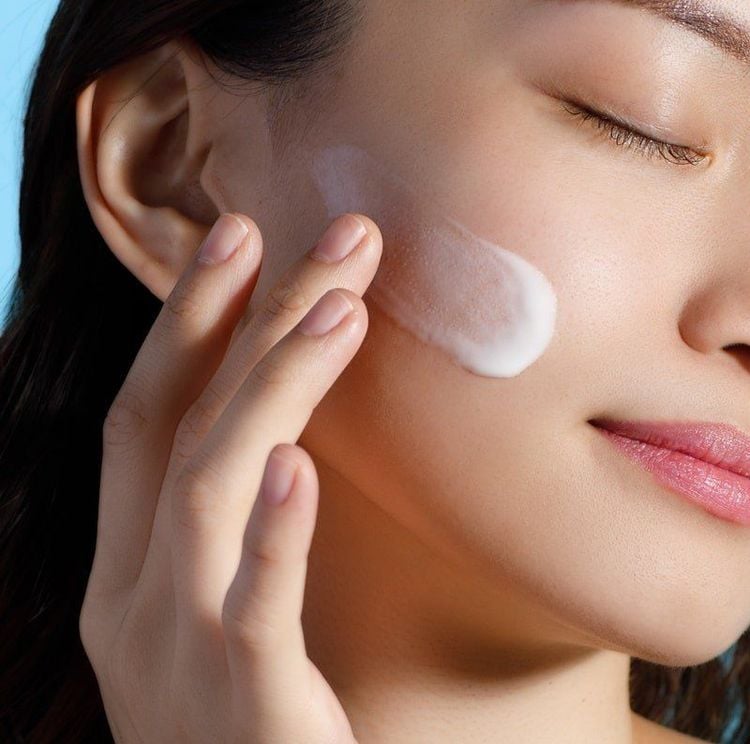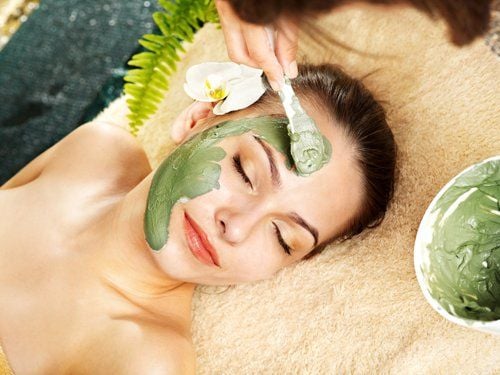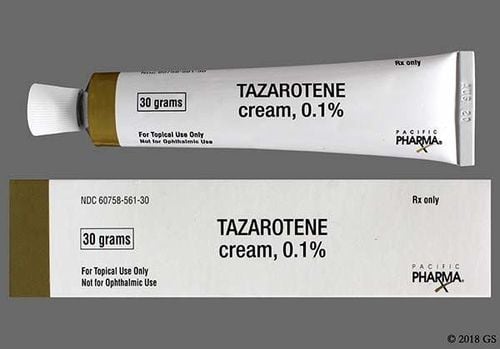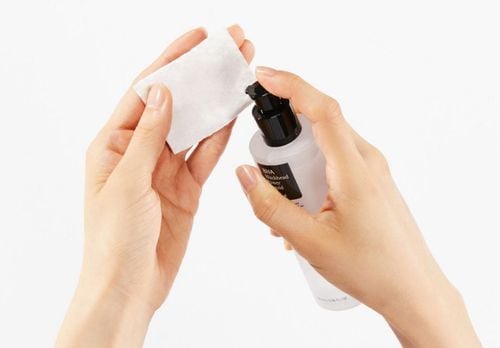This is an automatically translated article.
People with sensitive skin may find it very difficult to lead a normal life. Sometimes sensitive skin care never knows which products will cause redness or irritation, or sometimes it's just a guess. However, when equipping themselves with basic sensitive skin care notes, learning which products are suitable for sensitive skin, and how to keep skin normal and comfortable, people will life feels so much more comfortable.
1. What is sensitive skin?
Sensitive skin is not really a skin type but rather a skin condition and anyone can have sensitive skin. For example, someone with oily, acne-prone skin and also a sensitive skin.
Not only that, a person can still make their skin sensitive. It is when you have normal skin but accidentally burn or sting, red, tight and dry, become rough when in contact with certain skin care products and ingredients or even even household products like fabric softener or cleaning products.
Besides, sensitive skin can also result from different skin conditions like eczema, atopic dermatitis or rosacea. On the other hand, when the environment is too cold or even too hot, it can damage the skin and make it sensitive. If exfoliating too often or with products that are too strong, the skin barrier is damaged, the top layer of the skin that needs to play a role in protecting what's underneath and causing the skin to become sensitive too.

Da nhạy cảm là tình trạng da xuất hiện những vết ửng đỏ do viêm hoặc dị ứng
Furthermore, sensitive skin is often associated with extremely severe dryness, as the nerve endings in dry skin are not well protected from the environment. This leads to a very high risk of skin breakouts, pustules, skin abrasions, redness, and redness.
Thus, the concept of "sensitive skin" needs to be understood that when the skin barrier is damaged, for whatever reason, the skin will still be sensitive until a way to restore and renew the skin is found. his skin.
2. Notes when taking care of sensitive skin at home
To improve skin sensitivity and prevent flare-ups, everyone needs to know how to properly care for sensitive skin with these helpful tips:
Moisturize your body with lemon juice Lemon juice has Can help detoxify the blood and bring back natural glowing skin. Accordingly, should drink a glass of lemon water in the morning if you have sensitive skin. This can be helpful because the vitamin C and antioxidants in lemons help control the damaging effects of free radicals.
Furthermore, lemon juice helps to detoxify the blood, thus aiding in the prevention of blemishes, acne and wrinkles, for a naturally glowing skin. This habit should also be accompanied by drinking plenty of water during the day regularly to keep the skin hydrated from within and remove toxins from the body.

Chăm sóc da nhạy cảm bằng nước chanh
How to do it:
Squeeze half a lemon and mix it in a cup of warm water. Add honey to enjoy and drink on an empty stomach. You can have a meal after 30 minutes of drinking lemon water. Moisturize the skin regularly The role of moisturizing the skin regularly to prevent dryness, a condition that increases skin irritation for sensitive skin than other skin types.
Accordingly, moisturizing the skin regularly is essential, this is an important step in every skin care routine. Moisturizing cream has a mechanism to lock water in the skin, improve moisture, soothe the skin, restore skin lipids and improve the skin's moisture barrier.

Dưỡng ẩm cho da nhạy cảm
However, it is necessary to choose a moisturizer carefully, one that is suitable for your skin. Prioritize organic products over those containing a lot of chemicals, artificial colors and fragrances. Accordingly, choose products that contain beneficial ingredients such as natural plant-based oils, such as coconut oil (instead of mineral oil), olive oil, and almond oil, which help control oil production and make skin soothing. Users can find a variety of moisturizers specifically made for sensitive skin in pharmacies and skin care stores.
Always be careful when choosing new products for skin Sensitive skin still needs to use skin care products, makeup as well as cleansers. It is important to choose these products carefully. Avoid products that contain chemicals like parabens and artificial colors, as these can react with sensitive skin.
It is best to choose products labeled “artificial colors free” or “hypoallergenic”. In addition, users can also buy products with natural fragrances, but it would be better if they do not have perfume because they will be well tolerated by sensitive skin.
However, it is ideal to consult a dermatologist before trying a new product. Furthermore, always test a small amount of product on a small area of skin overnight to ensure there are no adverse reactions. Also, give the skin a day to a week to check if the skin really doesn't react to it.
Regularly apply sunscreen Overexposure to the sun can damage skin cells, often leading to skin rashes and other problems.

Sử dụng kem chống nắng cho dạ nhạy cảm
Therefore, always apply sunscreen before stepping outside. Use a broad-spectrum sunscreen, preferably one with zinc oxide and titanium oxide. Avoid using sunscreens with SPF more than 30, as they have higher amounts of acne-causing ingredients, which can be harmful to sensitive skin.
In addition, people can also wear sunglasses and other protective clothing to protect the skin from harsh UV rays.
Build a balanced diet A balanced diet can help improve your overall health and skin.
Indeed, diet always has a big influence on skin health. Doctors recommend following a diet with more natural foods and less processed foods to achieve a youthful, smooth skin.
In addition, attention should be paid to increasing the following anti-inflammatory and antioxidant foods in the diet to improve skin health and promote healing:
Organic fruits and vegetables, such as apples, blueberries, tomatoes and greens. These are foods rich in polyphenols and antioxidants that are beneficial for the skin. Sources of healthy fats, including avocados, nuts, and extra virgin olive oil.

Xây dựng chế độ ăn cân bằng cho da nhạy cảm
Cold water fish, such as sardines, wild salmon and herring. They are rich in omega-3 fatty acids. Consume these twice a week, or consult your doctor about using fish oil supplements containing EPA and DHA for plump skin. Healthy carbs, including beans, whole grains, berries, and squash. Orange-colored fruits and vegetables, such as carrots, tropical fruits, squash, and sweet potatoes, are rich in vitamin A. Nuts, such as almonds and walnuts. Food sources rich in vitamins A and E, selenium, zinc and antioxidants. The Mediterranean diet can help better manage sensitive skin, including consuming more vegetables, fruits, fish, whole grains, nuts, and healthy oils. In addition, there are food groups that should be avoided to prevent a sensitive skin reaction, including gluten-based foods such as soy sauce, beer, breads, cereals and other products made from rye, flour wheat and barley. Similarly, avoid soy products, red wine, eggs, and foods with artificial colors and preservatives.
Improve bathing habits Although hot baths are often favored to relax after a hard day at work, hot water can strip the skin of its natural oils, causing irritation, leading to red spots and blemishes. even cause dehydration. Using a heater in the winter has a similar effect on the skin.
So the best way is to avoid using hot water for bathing, use lukewarm water instead. At the same time, care should be taken to protect the skin from sudden temperature changes to prevent skin reactions.
Gently dry the skin. Remember to pat your face dry with a soft towel instead of rubbing it with a towel. Using a washcloth to rub your skin frequently can cause breakouts and redness, especially in people with sensitive skin.
Avoid corrosive detergents Skin can also react with traces of detergent left on clothes. Therefore, if you feel sensitive after putting on new clothes, it may be time to change to another detergent.
Should choose a gentle and soft detergent. Also, rubber gloves should be worn while handling detergents and other cleaning agents to prevent a possible corrosive reaction on the skin of the hands.
Clean skin with fresh milk The use of fresh milk as a facial cleanser for sensitive skin is quite popular. This is because raw milk contains anti-inflammatory agents, moisturizing properties, skin-nourishing ingredients and skin-brightening compounds that help to soothe the skin, reducing itching, dryness and pigmentation.

Sữa là nguyên liệu tốt cho da nhạy cảm
How to use:
Use a clean cotton pad to dab fresh milk on the skin. Rinse with warm water after 10-15 minutes. Besides, people can also make moisturizing masks with fresh milk. Just mix 1/2 teaspoon of flour with some milk to make a thick paste. Add a few drops of rose water and honey to the mixture. Apply the mixture on your neck and face. Rinse after 10 minutes with warm water. Use this mask weekly to quickly get a smooth, fresh skin. Mask with Oatmeal and Yogurt Homemade face masks with oatmeal and yogurt can help soothe irritated skin.
This is based on oatmeal's ability to act as an antioxidant and anti-inflammatory that helps soothe skin and prevent skin damage. Furthermore, oatmeal can be used to treat sunburn and moisturize the skin.
Yogurt contains lactic acid that gently exfoliates the skin, making the skin fresh and smooth. This ingredient can also reduce the appearance of fine lines and wrinkles.
How to use:
Mix 2 tablespoons of oatmeal with 2/3 tablespoons of yogurt. Apply the mask on your face. Wipe your face with a wet towel after 10–15 minutes. In addition to oatmeal and yogurt masks, there are several types of masks made from natural ingredients that can be suitable for sensitive skin care :
Mask with cucumber, oats mixed with honey Papaya mask Face mask yogurt and almond oil Use green tea The antioxidant properties in green tea can help rejuvenate the skin. In addition, the low caffeine content of green tea helps to soothe the skin without drying it out.

Bột trà xanh cung cập nhiều dưỡng chất cho da nhạy cảm
How to use:
Boil water and add some green tea leaves. Let the leaves soak for a few minutes and strain the liquid. Add a few drops of honey to the tea as the tea cools. Use a cotton ball to dab the tea on your face and keep it for about 10 minutes. Rinse your face with water, then apply a moisturizer with SPF. Repeat this remedy twice a week for sensitive skin care. Furthermore, drinking water made from green tea twice a day can also help improve skin health from within. In conclusion, sensitive skin can be a persistent condition, especially when sensitive skin care is not taken care of properly. However, if people actively improve their skin care routine and use products that are suitable for their skin according to the above notes when taking care of sensitive skin, the condition can be easily controlled. control. Of these, it's important to make sure you stay hydrated, moisturize your skin, apply sunscreen, and consult a dermatologist about the products that are best for your skin, as well as avoiding products that are too harsh for your skin. products and ingredients that cause future skin reactions.













